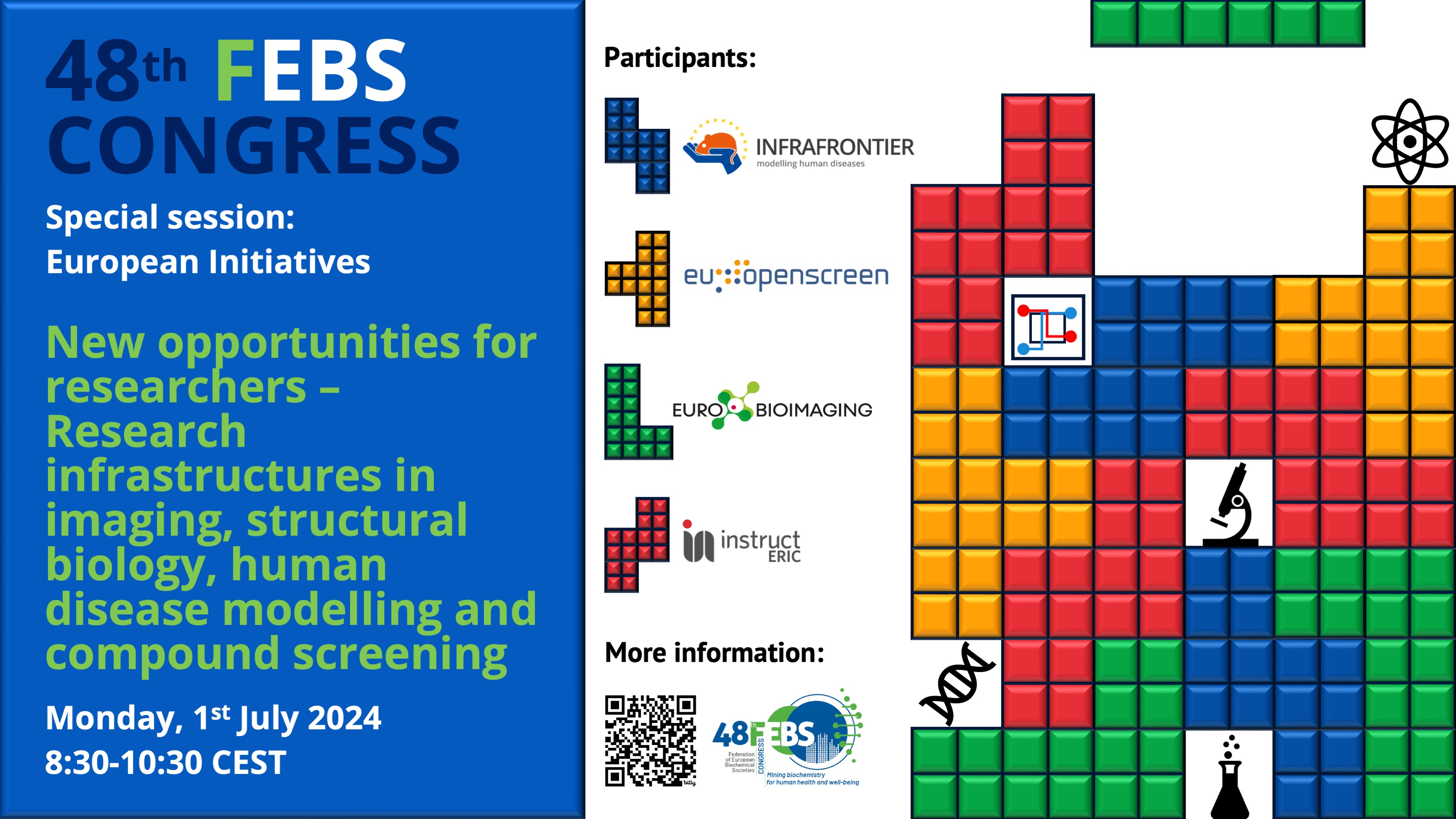
Special Sessions and Workshops
Educational Issues
From passive students to active learners: reimagining education with student-centered tools and unlocking engagement in the digital age
Tuesday July 2; 17:00-19:00: Organized by FEBS and IUBMB
Imagine a classroom where students aren't just passive sponges absorbing information, but active, engaged explorers building knowledge together. A place where technology enhances, not replaces, the power of human connection and collaboration. This is the future of education, and it's within reach. Join us for this dynamic session at FEBS Congress, where we'll dive deep into the transformative power of student-centered teaching and community building in both traditional and digital classrooms.
In the first talk titled ‘Enhancing Learning through Student-Centered Teaching Methods’, Dr. Sara Petchey (University of Zurich, Institute of Education) will equip you with practical tools and strategies to move beyond the lecture, unleash the power of analogies and embrace student misconceptions.
In the second talk titled ‘Fostering Sustainable Communities of Learning to Promote Learner Engagement’, Dr. Fun Man Fung (Department of Chemistry, National University of Singapore) will unveil a framework for building vibrant learning communities that bridge the social divide, catalyze active engagement, and champion inclusivity.
Beyond the presentations, two interactive workshops will provide space to implement these learnings, ask questions, and collaborate with fellow educators as we collectively envision the future of education.
Join us for this transformative session and prepare to unlock the full potential of your students and yourself!
Societal issues
Private and public funds in translational research
Sunday June 30; 17:00–19:00; Organized by the FEBS Science and Society Committee
This special session will be dedicated to those interested in moving research from the lab to applications, and is supported by the FEBS Science & Society Committee. Lectures will be offered by Claudia Pingue (senior partner, Technology Transfer Fund of CDP Venture Capital), by Immaculada Valle (Investment Manager at European Investment Fund) and by Professor Wilfried Ellmeier (Austria) representing the BioMed Alliance in Europe. This is a special opportunity to understand the huge number of options available at the European level and the possibility for you and/or your startup to be fully aware of what is offered at national and European level.
Scientific issues
Has the Warburg effect finally been explained?
Monday July 1; 15:30–16:00; Lilia Alberghina - Sysbio/ISBE Centre of Systems Biology Dept Biotecnology and Biosciences University of Milano-Bicocca, Milano, Italy
Cancer cells rewire their metabolism by increasing glucose uptake, stimulating lactate fermentation, in presence of functional mitochondria and, in doing so, enhance growth and proliferation: the so-called Warburg effect. A large, systemic, global view of metabolism is, for the first time, proposed here. Enhanced glycolysis integrated with mitochondrial heterogeneity is shown to generate faster growth rate, suggesting new anti-cancer drug discovery strategies.
Science in the Street: The importance of doing the right thing at the right time. How the circadian rhythms improve the quality of life
Date: Monday 1 July 2024
Time: 19:30-21:30
Location: University of Milano (Aula Magna) - via Festa del Perdono, 7 - Milano
How to reach the venue: Walk for about 5 minutes to reach Portello Metro station (M5 - lilac line). Take the train directed to Bignami and get off at Zara metro station. Here take the yellow line (M3) towards San Donato and get off at Missori (or Duomo). Walk for about 7 minutes until you reach the beautiful University of Milano, a Renaissance building commissioned by the Duke of Milan Francesco Sforza, just a stone's throw from the Duomo cathedral in the city centre.
Talks at the session will discuss the importance of doing the right thing at the right time: how respecting circadian rhythms may help metabolism and the treatment of several diseases and may improve the quality of life. The event will also be open for the local community, with limited seats available. Refreshments will be offered before the session, in the beautiful 18th century courtyard, on a "first come first served" basis.
European initiatives
New opportunities for researchers – Research infrastructures in imaging, structural biology, human disease modelling and compound screening
Monday July 1; 8:30–10:30; Organized by EU-OPENSCREEN
Research Infrastructures are publicly funded organisations which enable researchers to use specific technologies, resources and expertise that are not available at their own institutions, independent of pre-established collaborations and the location of their home institution. During this session, four research infrastructures in chemical biology (EU-OPENSCREEN), structural biology (Instruct-ERIC), biological and biomedical imaging (Euro-BioImaging) and human disease modelling (INFRAFRONTIER) present how scientists can work with these infrastructures to advance their research projects.
Molecular perspective of cellular processes
Monday July 1; 16:30–18:30; Organized by iNEXT-Discovery
The understanding of functional processes and their impairment due to mutations in the biomolecules involved or to changes in the cellular environment requires the characterization at atomic level of all the players involved in the process, their changes depending on the cellular conditions, and their dynamical interactions which determine the steps of the entire process. This is essential information for drug and vaccine design, as well as to develop effective therapeutic approaches. Furthermore, the effects of changes of various type, i.e. at atomic and at cellular levels, need to be addressed in order to understand alterations of the normal physiological pathways. Integrative structural biology approaches, combined with biophysical and computational tools, allow researchers to combine the atomic resolution with the cellular context. The EC's iNEXT-Discovery project and the European Research Infrastructure Instruct-ERIC provide scientists with access to these cutting-edge technologies.
Italian initiatives
Human Technopole: How National Facilities can enhance your research
Sunday June 30; 14:45-15:30; Organized by Human Technopole
Human Technopole (HT)’s mission is to promote frontier research, foster collaboration among scientists and bring added value to the research ecosystem in Italy and Europe. During this session you will learn how HT shared infrastructure – the National Facilities – can enhance your research by providing access to cutting-edge technologies and high-quality training. You will also find information on the open calls for access that are currently available for the national community.
Biotechnology: The CIB Contributions
Tuesday July 2; 8:30–10:30; 17:00-19:00; Organized by Consorzio Interuniversitario per le Biotecnologie
The purpose of the Consortium is to promote and coordinate scientific research and transfer activities in the field of advanced biotechnologies in the biomedical, agri-food, industrial and pharmaceutical, zootechnical-veterinary and environmental sectors, making use of research units in the consortium member universities. It is a transversal structure which also has the aim of overcoming "academic barriers", encouraging and stimulating collaboration between research groups from different cultural and scientific areas. Through this integration and exchange it becomes possible to promote projects that require complementary and interdisciplinary skills for their realization.
Immunotherapy: treatment and prevention of infectious and tumor diseases (Immuno-HUB)
Wednesday July 3; 8:30-10:30: Organized by Immuno-Hub project
Immuno-HUB is a flexible Italian platform aimed at providing a rapid response to new epidemiological needs, such as emerging infections, through monitoring and prevention methods for infectious diseases. In particular, this project, in its various articulations, aims to identify innovative solutions to cope infections, to identify biomarkers for the epidemiological monitoring of infections and the prognostic evaluation and response to tumor therapy.
Workshops
Reforming research assessment to support the improvement of research quality
Chair: Menico Rizzi (IT)
Monday July 1; 14:15-15:30
There is a growing consensus that current research assessment systems need to be adjusted to enhance the quality and impact of research. Scholarly values such as scientific rigor, autonomy, integrity, openness, and inclusiveness are central to this aim as well as are the recognition of diverse research output and a research assessment primarily based on qualitative evaluation supported by responsible use of quantitative indicators. Initiatives, actions and point of views along these lines of different stakeholders, will be discussed.
How to prepare a perfect graphical abstract
Tuesday, July 2; 14:30–15:30; Organized by FEBS
This is a workshop for PhD students and postdocs with a journal editor and professional graphic artist on how to prepare good graphical abstracts for publication: fonts, colours, etc.
YSF Bridge and beyond
Monday, July1; 13:30- 14:30; Organized by FEBS Careers of Young Scientists Committee.
We cordially invite especially PhD students and postdocs to take part in this event aiming at those who want to learn more about the FEBS Young Scientists’ Forum (YSF) and other activities for young scientists (FEBS-IUBMB-ENABLE Conference, FEBS Junior Section). After a brief introduction to the activities, we will share recollections from previous events, and present opportunities to participate in the FEBS YSF 2025, which will be held in conjunction with the 49th FEBS Congress in Türkiye. There will be an interactive quiz for prizes and the first hundred people to register will also get a lunch box and Italian gelato. Don’t miss out this opportunity and register at the #youngFEBS booth to pick up your voucher!



